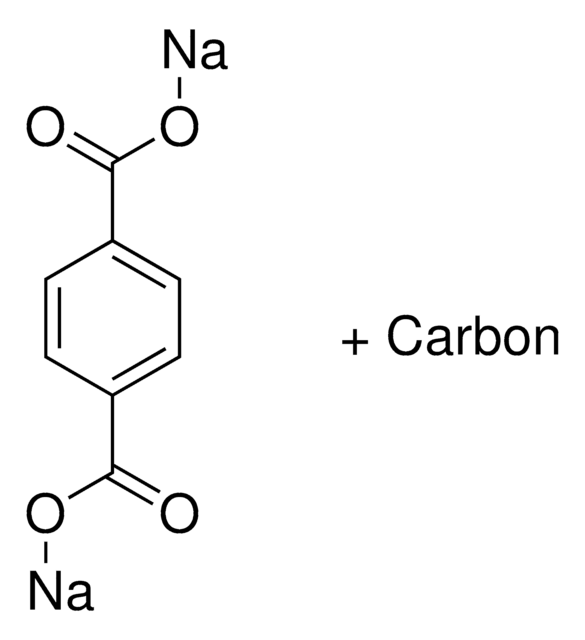추천 제품
Quality Level
분석
≥98% (acidimetric)
형태
crystalline
autoignition temp.
496 °C
효능
>6400 mg/kg LD50, oral (Rat)
mp
402 °C (sublimed)
solubility
15 mg/L (experimental)
density
1.51 g/cm3 at 20 °C
저장 온도
2-30°C
InChI
1S/C8H6O4/c9-7(10)5-1-2-6(4-3-5)8(11)12/h1-4H,(H,9,10)(H,11,12)
InChI key
KKEYFWRCBNTPAC-UHFFFAOYSA-N
애플리케이션
- Biotransformation of p-xylene into terephthalic acid by engineered Escherichia coli: This study explores an alternative production method for terephthalic acid (TPA) that could be less energy-intensive and safer than traditional methods. It reports the successful bioconversion of p-xylene into TPA using genetically engineered E. coli, highlighting a potential sustainable approach to TPA production (Luo & Lee, 2017).
- Synthesis and verification of biobased terephthalic acid from furfural: This research presents a novel synthetic pathway for producing TPA from biomass-derived furfural. It represents a significant step towards sustainable chemical production, providing a greener alternative to petrochemical routes (Tachibana, Kimura & Kasuya, 2015).
- Studies on the solubility of terephthalic acid in ionic liquids: Focused on identifying better solvents for TPA, this study investigates the solubility of TPA in various ionic liquids. The findings could lead to improved processing techniques for TPA in industrial applications (Matuszek et al., 2019).
- Engineering terephthalic acid product from recycling of PET bottles: This study explores the depolymerization of PET into TPA and ethylene glycol, highlighting a sustainable approach to recycle PET waste and reduce reliance on petrochemicals (Lee, Chiu & Lee, 2021).
- Biobased terephthalic acid technologies - a literature review: Reviews various biobased approaches to produce TPA, focusing on the potential of renewable feedstocks to replace traditional petrochemical routes. This comprehensive review discusses different biotechnological and chemical methods to synthesize TPA from bio-based sources (Collias et al., 2014).
분석 메모
Assay (acidimetric): ≥ 98.0 %
Identity (IR): passes test
Identity (IR): passes test
Storage Class Code
11 - Combustible Solids
WGK
WGK 1
Flash Point (°F)
Not applicable
Flash Point (°C)
Not applicable
시험 성적서(COA)
제품의 로트/배치 번호를 입력하여 시험 성적서(COA)을 검색하십시오. 로트 및 배치 번호는 제품 라벨에 있는 ‘로트’ 또는 ‘배치’라는 용어 뒤에서 찾을 수 있습니다.
이미 열람한 고객
자사의 과학자팀은 생명 과학, 재료 과학, 화학 합성, 크로마토그래피, 분석 및 기타 많은 영역을 포함한 모든 과학 분야에 경험이 있습니다..
고객지원팀으로 연락바랍니다.










